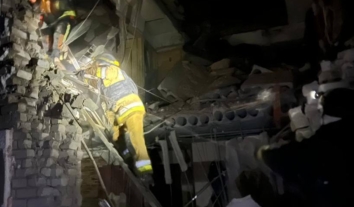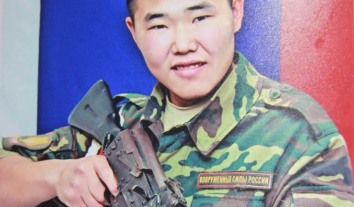Journalism under siege for over a decade in temporarily occupied Crimea: How Russia has stifled freedom of the press on the Ukrainian peninsula
The media landscape in the temporarily occupied Crimea was purged almost immediately after Russia’s military operation to seize the peninsula. The policy of destroying independent media deprives Crimean residents of access to information from independent journalists, creating a propaganda bubble.
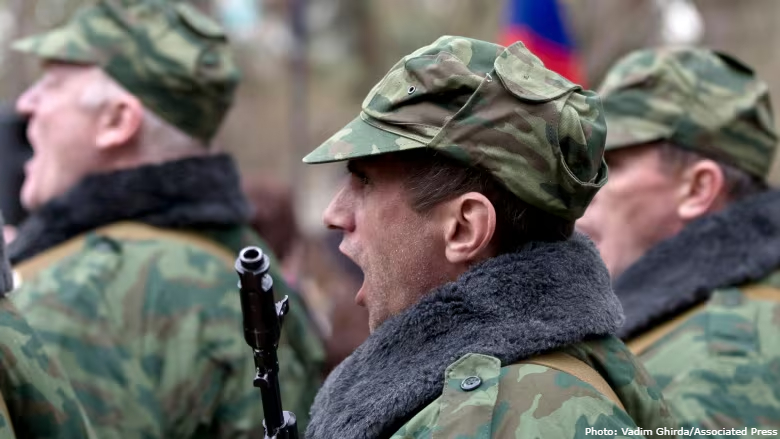 Some 30 men armed with automatic weapons and another 20 or so unarmed, were sworn in as a pro-Russian force, dubbed the ‘military forces of the Autonomous Republic of Crimea’ at a park in Simferopol
Some 30 men armed with automatic weapons and another 20 or so unarmed, were sworn in as a pro-Russian force, dubbed the ‘military forces of the Autonomous Republic of Crimea’ at a park in SimferopolAs Amnesty International noted in its report marking the 10th anniversary of the occupation of the Crimean Peninsula, before the Russian occupation, Crimean media enjoyed considerable freedom and notable pluralism.
Following Russia’s military operation to seize the Crimean Peninsula, and in contravention of international lawі , Yuliya Martynova, the de facto “Deputy Minister for Internal Politics, Information, and Mass Communications,” announced that all media outlets in Crimea should re-register in accordance with Russian legislation by the deadline of 1 January 2015. She warned them that any “provocative” acts thereafter would result in sanctions.
The unlawful mandatory re-registration was strictly enforced but also marked by arbitrary refusals targeting independent media. According to a report by the Council of Europe, the number of media outlets in Crimea had declined by 90% by 2022.
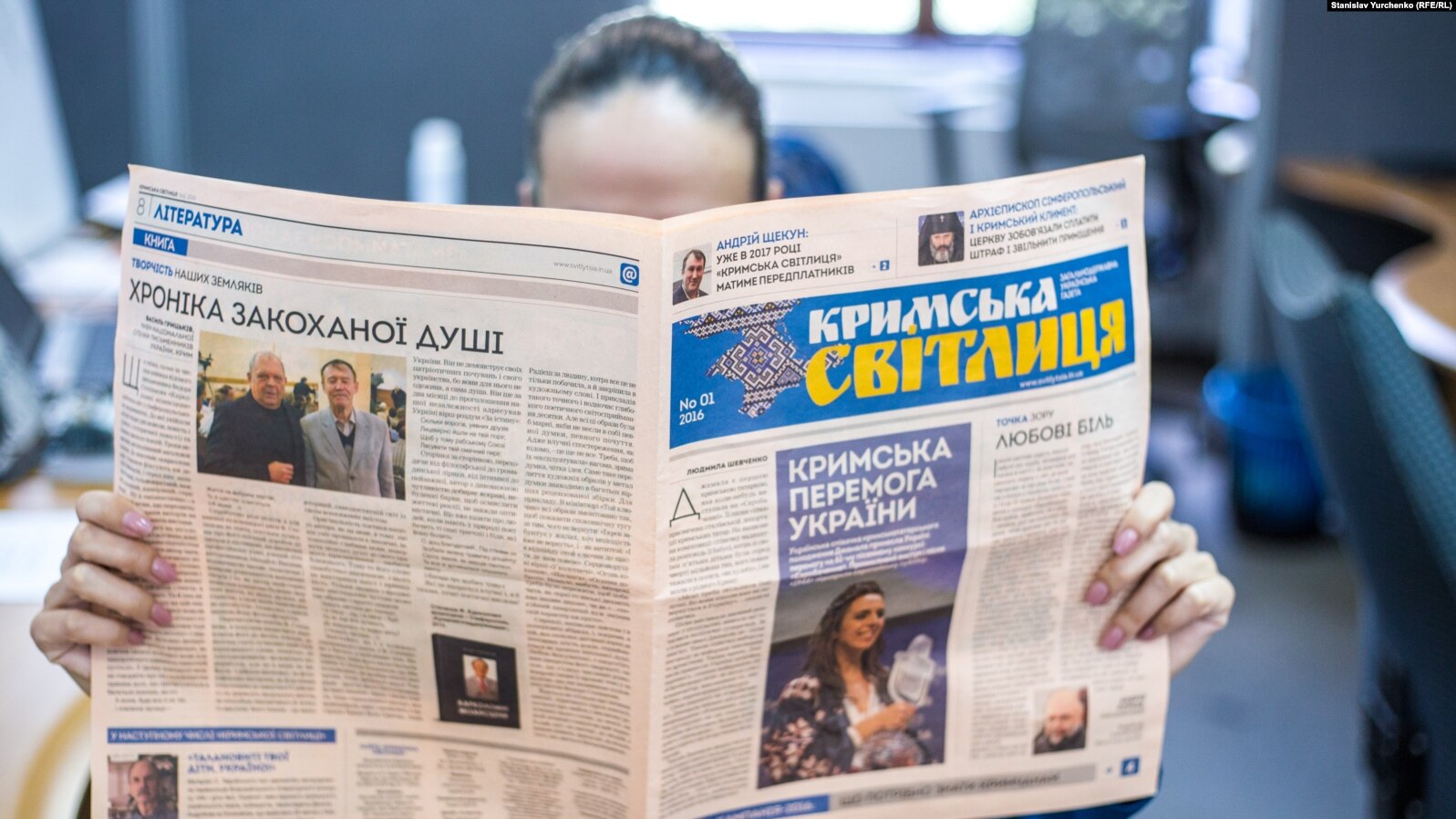
As early as March 2014, Ukrainian-language television and radio channels were jammed, taken off-air, and replaced by Russian media. The only remaining independent Ukrainian-language newspaper, Krymska Svitlytsia, was banned and closed.
Crimean Tatar-language outlets were particularly affected by the new restrictive media environment. The popular television channel ATR attempted to reregister multiple times, yet its application was arbitrarily rejected.
On 26 January 2015, some 30 armed masked men from the riot police unit, as well as ten officials from the Russian Investigative Committee and the Federal Security Service, searched ATR’s offices for several hours.
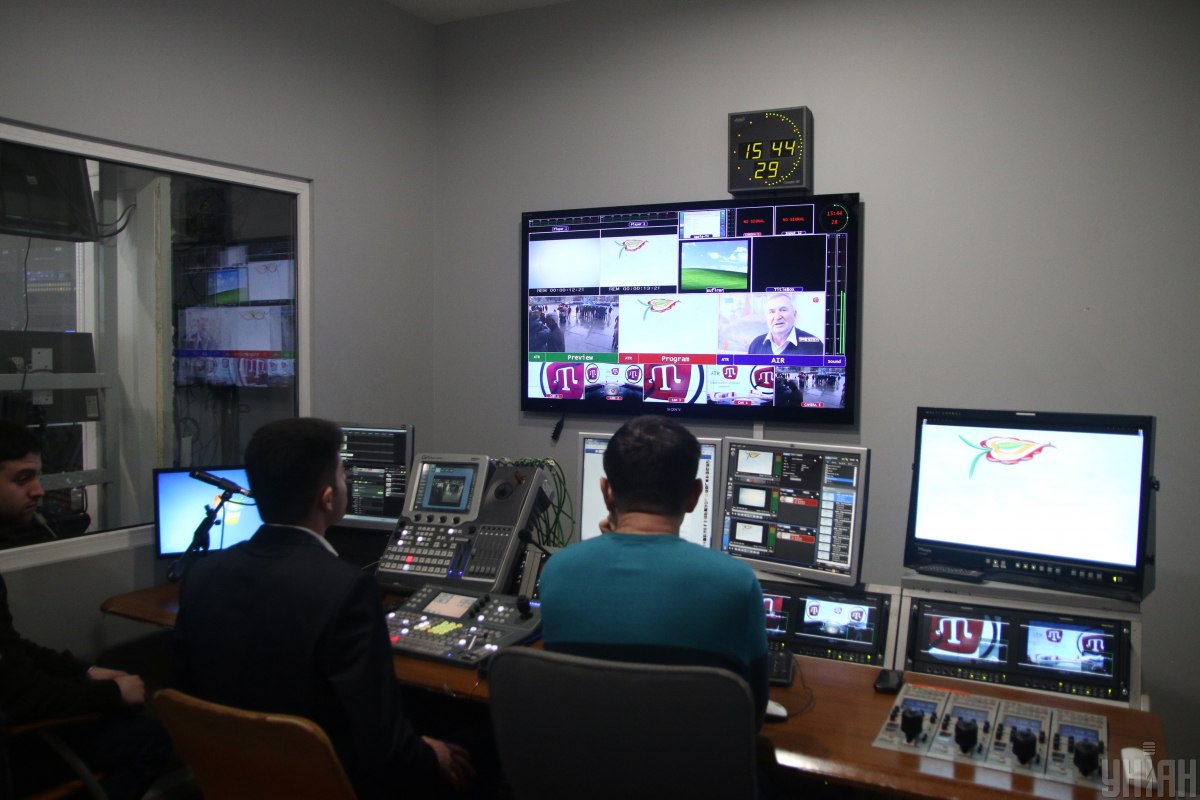 The editorial staff of the Crimean Tatar TV channel ATR, forced to stop broadcasting from Simferopol (Crimea) on April 1
The editorial staff of the Crimean Tatar TV channel ATR, forced to stop broadcasting from Simferopol (Crimea) on April 1They disrupted regular broadcasting and took away computer servers. The ATR TV channel editors told Amnesty International they had received unofficial warnings over the phone from influential people they were unwilling to name for fear of reprisals in response to some of its coverage of events affecting the Crimean Tatar community. ATR was eventually forced to relocate to mainland Ukraine and lost its ability to broadcast in Crimea.
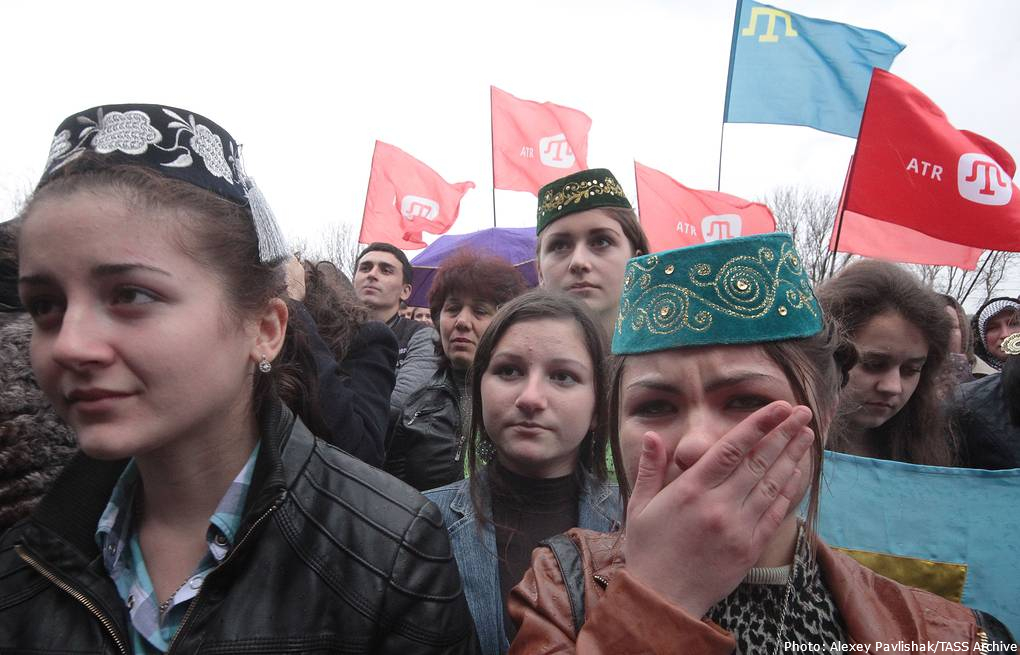 Local residents hold a rally in support of ATR Crimean Tatar TV channel, March 31, 2015
Local residents hold a rally in support of ATR Crimean Tatar TV channel, March 31, 2015Independent journalists have also faced harassment and persecution by the de facto authorities in Crimea.
Before the unrecognised “referendum” on Crimea’s status in 2014, paramilitaries from the so-called Crimean “self-defense” engaged in a campaign of violence targeting pro-Ukrainian activists, which resulted in the disappearance of, amongst others, several journalists.
In 2015, the Organization for Security and Co-operation in Europe reported that media freedom in Crimea was at an “all-time low,” as journalists from at least 13 media outlets had been threatened, attacked, interrogated, or kidnapped.
The de facto “courts” have also been used to stymie media freedom. For example, in September 2017, Ukrainian journalist Mykola Semena was given a two-and-a-half-year suspended prison sentence for “threatening the territorial integrity of the Russian Federation” due to his public opposition to the Russian occupation and annexation of Crimea.
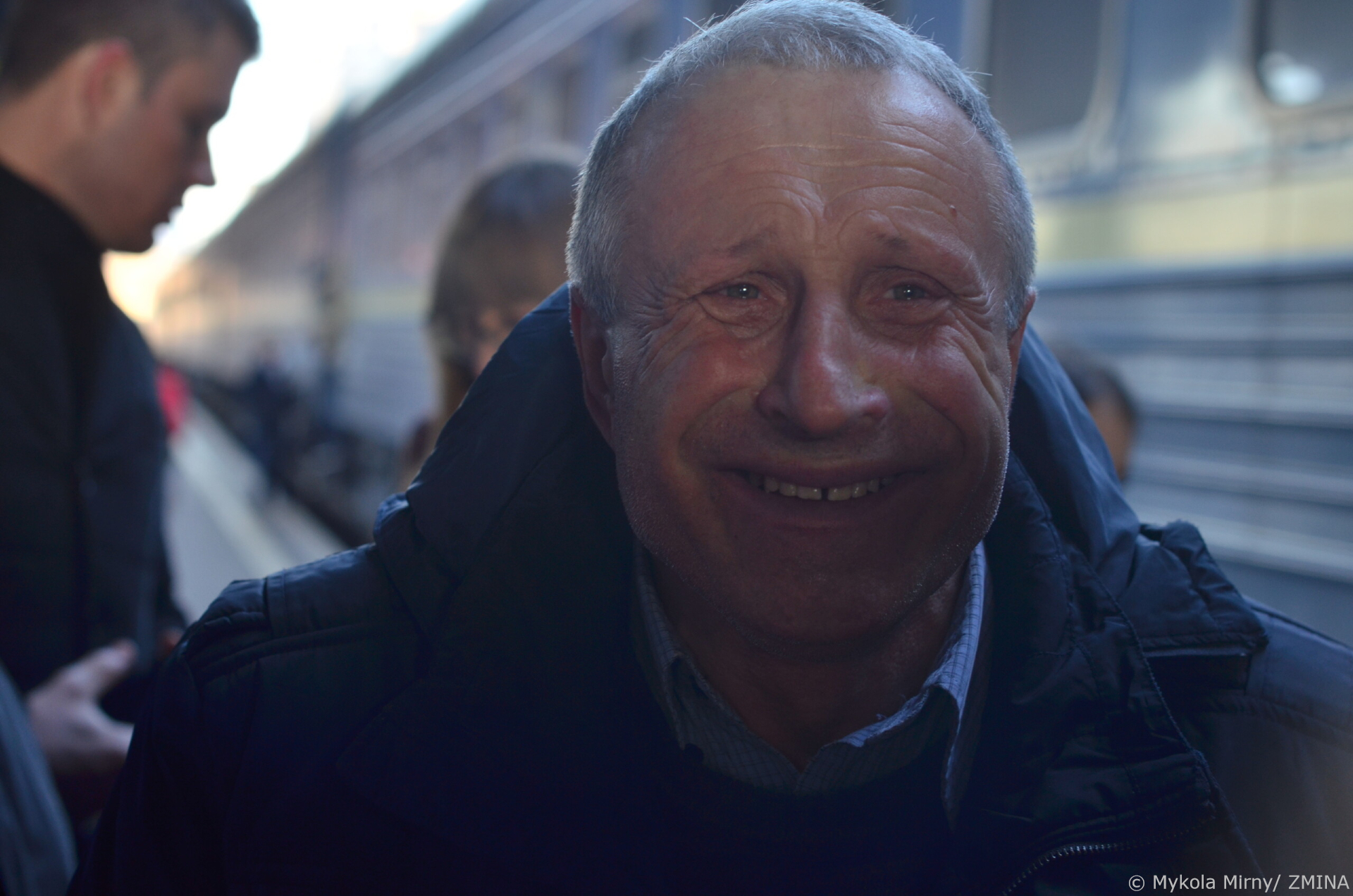 Mykola Semena
Mykola SemenaIn December 2020, the owner of ATR TV, Lenur Islyamov, was sentenced to 19 years in prison in absentia on spurious charges.
The de facto authorities also widely targeted independent journalists with extrajudicial restrictions. For instance, on 18 January 2020, Russian border guards denied journalist Taras Ibrahimov entry to Crimea from mainland Ukraine and issued him a written warning not to attempt re-entry until 2054 or face criminal prosecution under Russian law.
The crackdown on independent media resulted in what Freedom House called an “information ghetto,” whereby residents of Crimea are severely deprived of information from the rest of Ukraine, Amnesty International noted.
Amnesty International highlighted that the restrictions on media freedom have become significantly more stringent in Russia – and in areas of Ukraine under its control – since its full-scale invasion of Ukraine.
The banning of popular social media services such as Facebook and Instagram renders information from the rest of Ukraine even harder to come by, while legal measures introduced following Russia’s full-scale invasion of Ukraine have criminalised dissemination of “knowingly false” information about the Russian Armed Forces. In practice, any critical information, however factually accurate, is banned if it contravenes official Russian sources.
The penalties for this “crime” include heavy fines that range from RUB 700,000 to RUB 5,000,000 (US$ 5,220 to US$ 37,283) and imprisonment from three to 15 years. Russia’s efforts to control the media environment in the temporarily occupied Crimea have resulted in the near total isolation of the peninsula from the rest of Ukraine, while crushing any dissenting voices on the peninsula itself.
Previously, the Crimean Plattform reported that on May 17, 2024, Russian security forces illegally broke into the house of the editor-in-chief of the Crimean Tatar newspaper QIRIM Bekir Mamutov and its employee Seiran Ibrahimov. The editor-in-chief of QIRIM was illegally accused of “discrediting the Russian Armed Forces.”
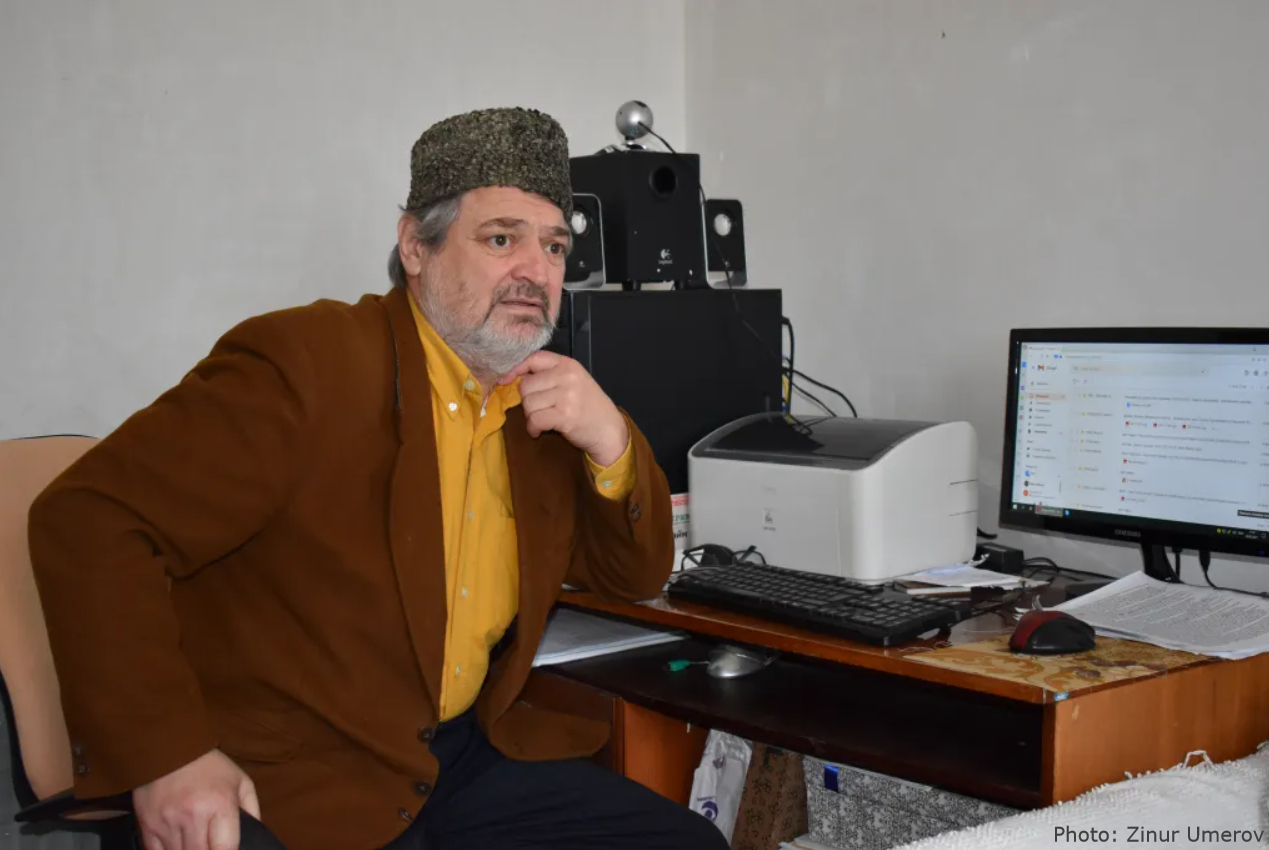 Bekir Mamutov
Bekir MamutovOn the eve of the illegal searches, Bekir Mamutov gave an interview about peaceful demonstrations to honor the victims of the genocide of the Crimean Tatar people in occupied Crimea.
The occupiers initiated an administrative case due to a text about the mobilization in Crimea in September 2022, when a large number of Crimean Tatars were forcibly conscripted into the occupying army. The illegitimate “Kyiv District Court” in the temporarily occupied Simferopol found the Crimean Tatar newspaper guilty of “discrediting” the Russian armed forces and fined it RUR 300,000 for publishing allegedly “false information.”
According to the Mission of the President of Ukraine in the Autonomous Republic of Crimea, as of June 4, 2024, the Russian Federation has illegally imprisoned 218 people. At least 16 of them are journalists, civic journalists, and bloggers. Amongst those who became political prisoners for covering human rights violations and freedom of speech in occupied Crimea: Iryna Danylovych, Osman Arifmemetov, Oleksii Bessarabov, Tymur Ibrahimov, Remzi Bekirov, Vilen Temerianov, Marlen (Suleiman) Asanov, Nariman Dzhelial, Rustem Sheikhaliiev, Server Mustafaiev, Vladyslav Yesypenko, Amet Suleimanov, Asan Akhtemov, Ruslan Suleimanov, Seiran Saliiev, and Dmytro Shtyblikov.
In March 2021, the editor of Crimea.Realities news portal, Volodymyr Prytula, reported that over the years of the occupation of Crimea, more than 50 journalists of the outlet have been subjected to pressure from the Russian intelligence services. Due to pressure, 27 media workers stopped cooperating with the Crimea.Realities, a project of Radio Liberty, and 29 left the Autonomous Republic of Crimea.
Throughout 2022 and 2023, the ZMINA Human Rights Center recorded 162 cases of pressure on journalists in the temporarily occupied Crimea. Viktoria Nesterenko, project manager of the ZMINA Human Rights Center, explained that over the ten years of Russian aggression, the methods of the occupying authorities regarding journalists have not changed. On the contrary, the pressure has intensified, and new methods have appeared.
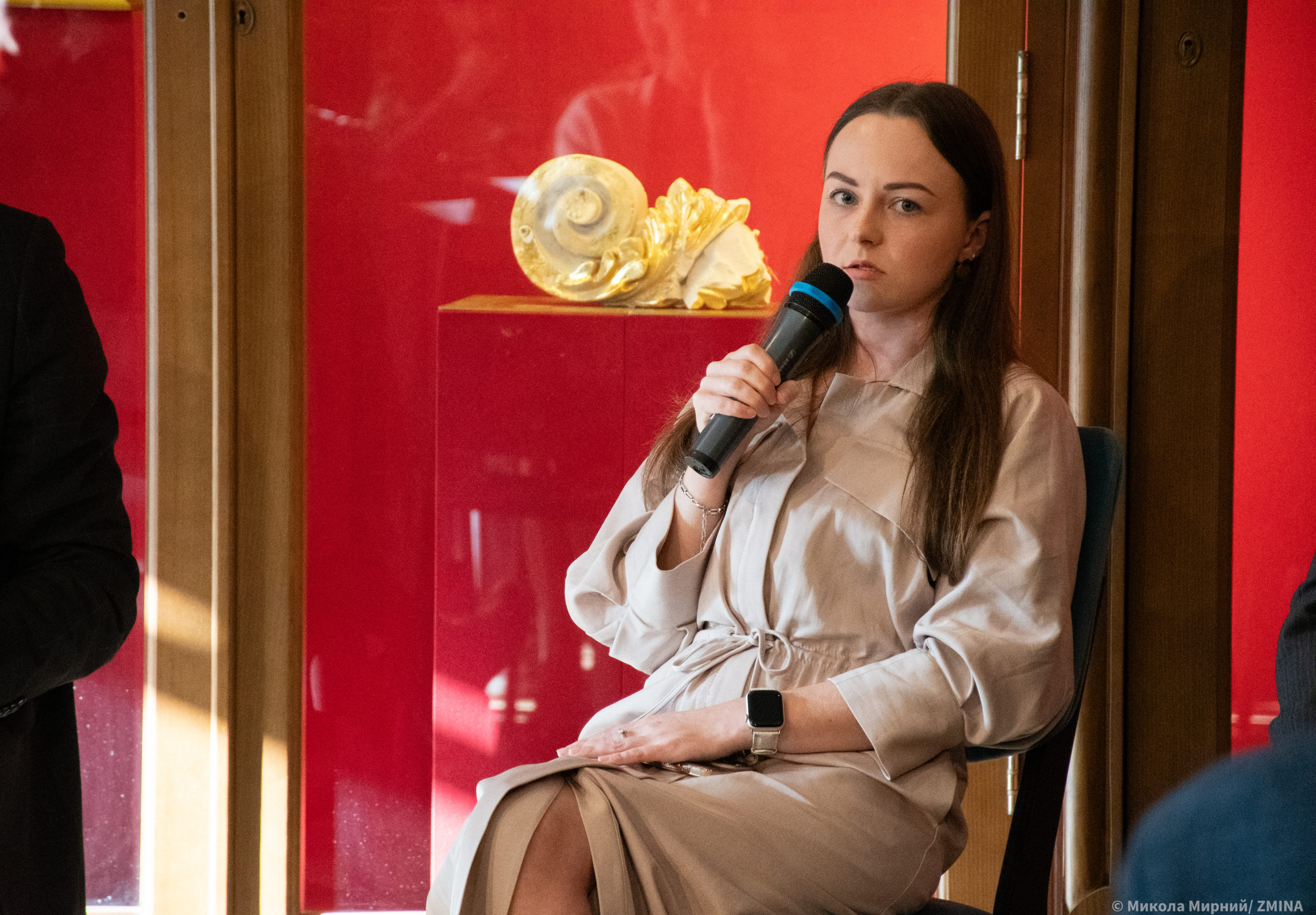 Viktoria Nesterenko
Viktoria NesterenkoOn the eve of the illegal searches, Bekir Mamutov gave an interview about peaceful demonstrations to honor the victims of the genocide of the Crimean Tatar people in occupied Crimea.
Access to radio in the occupied territories or areas of military operations is patchy, as Russia has been jamming Ukrainian FM stations in Crimea and the occupied Donetsk and Luhansk regions since 2014.
Zelenskyy’s Mission remarked that after the full-scale invasion in 2022, it became even more difficult to obtain objective information from occupied Crimea. Changes in the Russian Federation’s legislation made it much easier for the occupying state to harass the media and facilitate the formation of lists of so-called “extremists,” illegally extending this to the temporarily occupied territories. This practice also applies to ordinary Ukrainian citizens who publish information or opinions unfavourable to the occupiers on social media.
The Mission of the President of Ukraine in the Autonomous Republic of Crimea expressed its gratitude for the dedication and fearless work under threat to every person whose report covers the war crimes of the aggressor state, committed, in particular, on the territory of the Crimean Peninsula.
We believe that freedom of speech will soon return to Crimea, and journalists from all over the country will freely share the victories and accomplishments of our society and state in the international space," the Mission of the President of Ukraine in the Autonomous Republic of Crimea said in its statement.
In April 2024, the National Union of Journalists of Ukraine reported that at least 28 Ukrainian media workers and citizen journalists, including those in the temporarily occupied Crimea, are being held in captivity “as a result of illegal detentions, capture, false accusations, and sham “trials” by Russian occupiers in Ukraine”. The Union also published a list of imprisoned journalists.
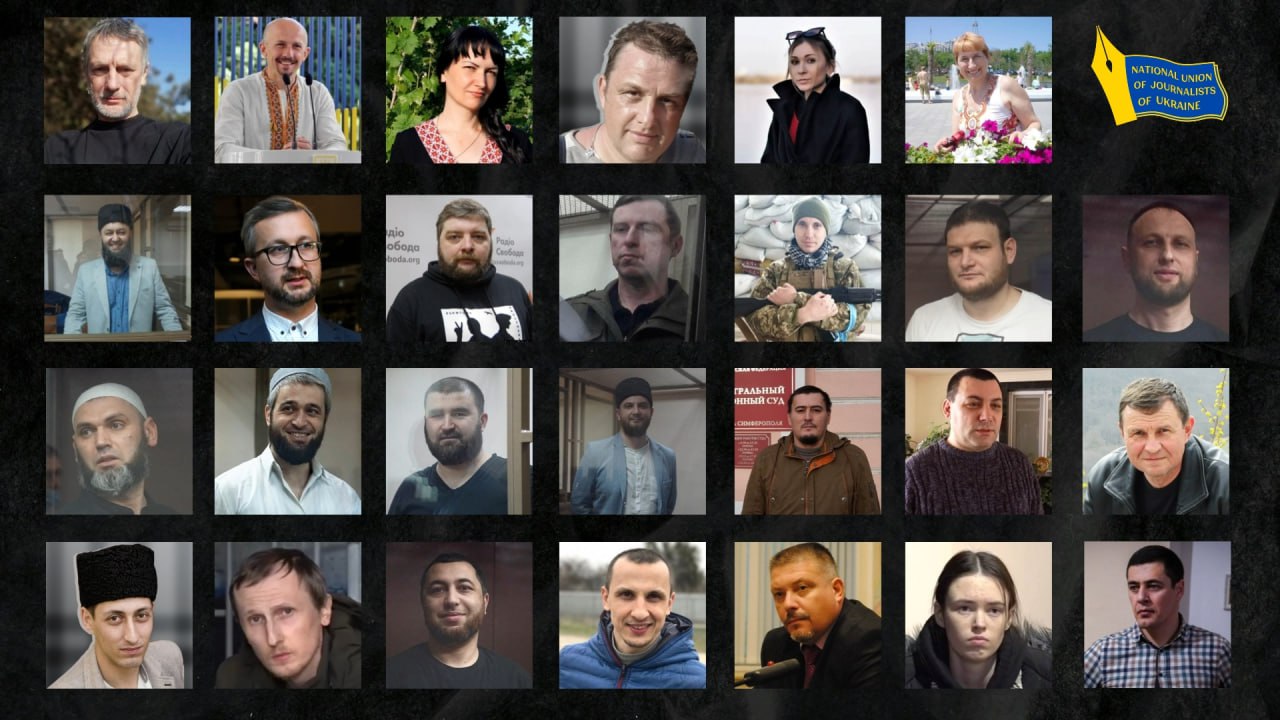
Earlier, the Committee to Protect Journalists (CPJ) called on the temporary authorities in the Russian-occupied Ukrainian peninsula of Crimea to stop intimidating journalist Lutfiye Zudiyeva and let members of the press work freely.
The human rights community in Ukraine also believes that the de-occupation of Crimea is necessary to stop the systematic violations of human rights committed by the Russian Federation on the peninsula. They are urging other countries to support Ukraine with timely and sufficient weapons and military equipment supplies towards this end.
Earlier, the human rights NGO Crimea SOS emphasised that ignoring the war crimes of the Russian occupiers has led to a deterioration of the human rights situation in the occupied Crimea. The lack of response from the international community to the occupation of Crimea and the further crimes of the occupiers made it easier for Russia to turn the peninsula into a springboard for the invasion of mainland Ukraine in 2022.
In July 2023, Wayne Jordash, the managing partner of Global Rights Compliance LLP, said that the International Criminal Court is not doing enough to investigate international crimes against civilians in the temporarily occupied Crimea.


